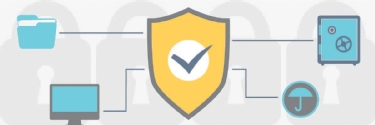Security
This cyber security glossary explains the meaning of terms about different types of computer security threats as well as words about application security, access control, network intrusion detection, security awareness training and computer forensics.

Authentication and access control
Terms related to authentication, including security definitions about passwords and words and phrases about proving identity.
-
What is identity and access management? Guide to IAM
No longer just a good idea, IAM is a crucial piece of the cybersecurity puzzle. It's how an organization regulates access to information and meets its compliance obligations.
-
What is data masking?
Data masking is a security technique that modifies sensitive data in a data set so it can be used safely in a non-production environment.
-
What is a cloud access security broker (CASB)?
A cloud access security broker (CASB) is a software tool or service that sits between an organization's on-premises infrastructure and a cloud provider's infrastructure.
Compliance, risk and governance
This glossary contains definitions related to compliance. Some definitions explain the meaning of words used in compliance regulations. Other definitions are related to the strategies that compliance officers use to mitigate risk and create a manageable compliance infrastructure.
-
What is a chief data officer (CDO)?
A chief data officer (CDO) in many organizations is a C-level executive whose position has evolved into a range of strategic data management responsibilities, including data governance, data quality and data strategy.
-
What is business process outsourcing (BPO)?
Business process outsourcing (BPO) is a business practice in which an organization contracts with an external service provider to perform an essential business function or task.
-
What is data masking?
Data masking is a security technique that modifies sensitive data in a data set so it can be used safely in a non-production environment.
Network security
Terms related to network security, including definitions about intrusion prevention and words and phrases about VPNs and firewalls.
-
What is antivirus software?
Antivirus software (antivirus program) is a security program designed to prevent, detect, search and remove viruses and other types of malware from computers, networks and other devices.
-
What is a cloud access security broker (CASB)?
A cloud access security broker (CASB) is a software tool or service that sits between an organization's on-premises infrastructure and a cloud provider's infrastructure.
-
What is hardware security?
Hardware security is vulnerability protection that comes in the form of a physical device rather than software installed on a computer system's hardware. It also refers to the protection of physical systems from harm.
Security Admin
Terms related to security management, including definitions about intrusion detection systems (IDS) and words and phrases about asset management, security policies, security monitoring, authorization and authentication.
-
What is identity and access management? Guide to IAM
No longer just a good idea, IAM is a crucial piece of the cybersecurity puzzle. It's how an organization regulates access to information and meets its compliance obligations.
-
What is counterintelligence?
Counterintelligence (CI) is the information gathered and actions taken to identify and protect against an adversary's knowledge collection activities or attempts to cause harm through sabotage or other actions.
-
What is digital trust?
Digital trust is the confidence users have in the ability of people, technology and processes to create a secure digital environment.
Threat management
Terms related to security threats, including definitions about anti-virus programs or firewalls and words and phrases about malware, viruses, Trojans and other security attacks.
-
What is counterintelligence?
Counterintelligence (CI) is the information gathered and actions taken to identify and protect against an adversary's knowledge collection activities or attempts to cause harm through sabotage or other actions.
-
What is antivirus software?
Antivirus software (antivirus program) is a security program designed to prevent, detect, search and remove viruses and other types of malware from computers, networks and other devices.
-
What is a stealth virus and how does it work?
A stealth virus is a computer virus that uses various mechanisms to avoid detection by antivirus software.